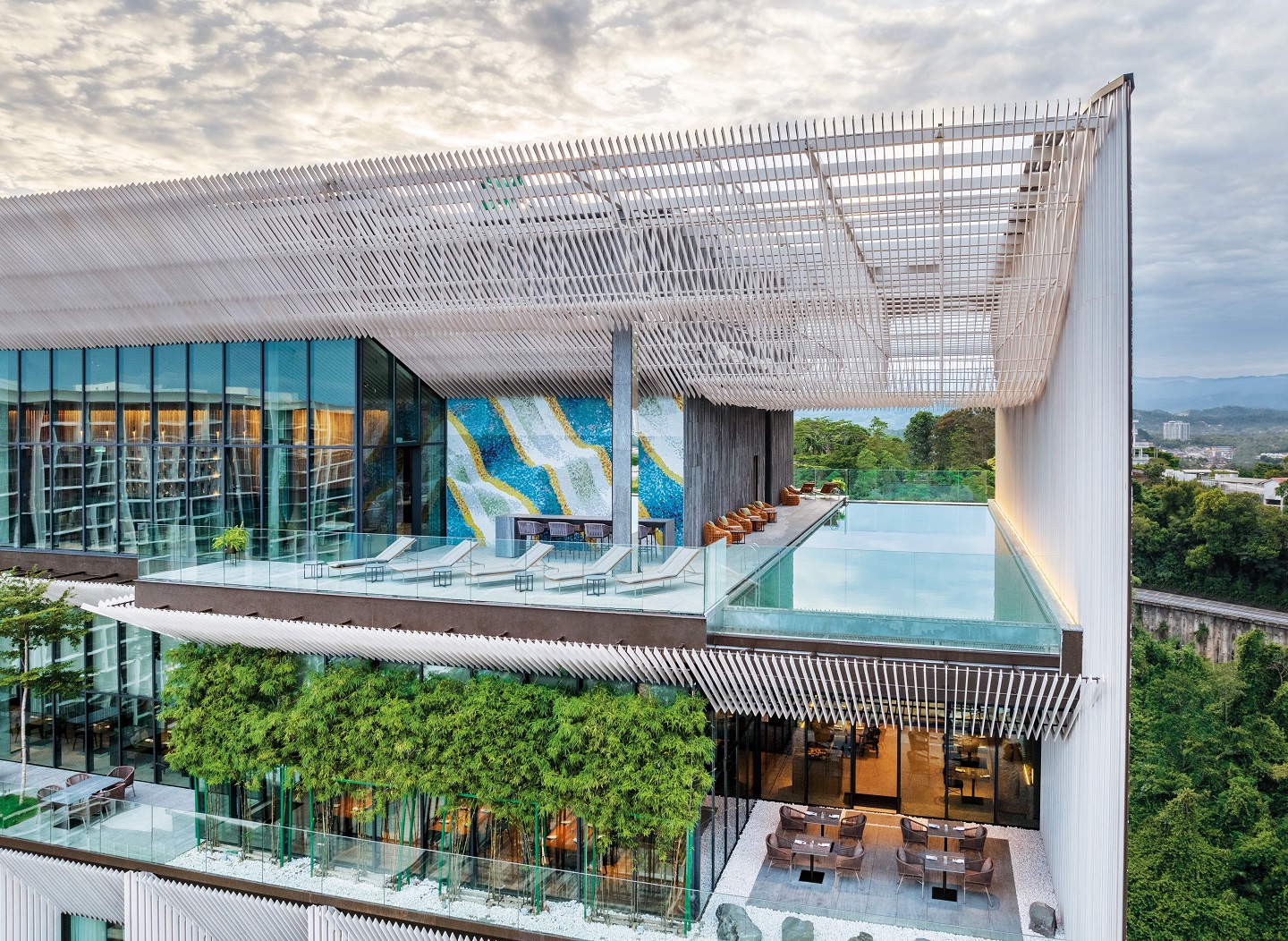
Kengo Kuma envisioned Hyatt Centric Kota Kinabalu as a majestic tree (All photos: Hyatt Centric Kota Kinabalu)
Adventure and discovery are intertwined branches of the Hyatt Centric Kota Kinabalu, which Japanese architect Kengo Kuma envisioned as a majestic tree. Taking pride of place in the heart of the city, between Signal Hill and the South China Sea, the hotel entices with what nature has to offer as well as the culture and traditions that cradle Sabah. Yet, it encourages guests to step out for more.
General manager Ruben Schrijver puts it well: “We are not a destination hotel in itself. We want people to stay here but also get on a boat, climb the mountain, go to the jungle, explore Gaya Street or go down Jalan Ewan. That’s what this place is about. You are here for a reason. Now go anywhere.”
Surprises await those who want a taste of hill, land and sea in this charming capital of the Land Below the Wind. As a “launchpad”, Hyatt Centric is designed to whet the appetite of visitors who can map their itinerary to choice locations from this starting point.
Kuma, who built Japan’s National Stadium for Tokyo 2020, used the metaphor of nature in Sabah and Borneo in Hyatt Centric’s design. The building proper is the trunk, with its roots represented by bamboo thriving at the lobby. Wood elements fit naturally around this lifestyle hotel, with timber slats, panels and fuss-free furniture adding a sleek, clean-cut feel to the rooms and general areas.
Nature and culture have their place too, in subtle and obvious ways. The numbers of every floor are “written” on walls using seashells. Carpets woven in signature shades and motifs representative of ethnic groups such as the Kadazans and Dusuns add pops of colour to the rooms. Papercuts of butterflies on a wall are poised to get dinner guests talking while wooden wall sculptures by local artists reveal stories about people and places in the state.
hyatt_centric_kk_framed_papercuts_of_butterflies_at_on22_by_raku_inoue_1.jpg
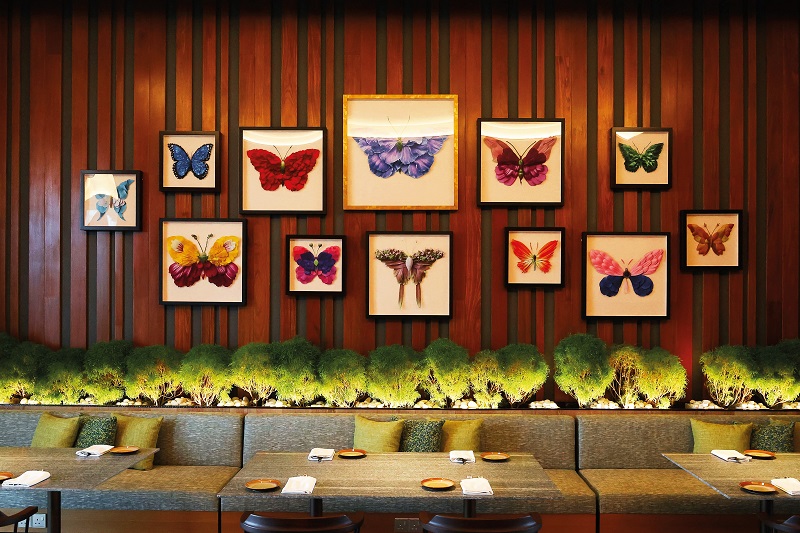
Crowning Hyatt’s sturdy “tree” is its ON23 Sky Bar, with the adjacent 25m, double-edged rooftop infinity pool. This is the spot to stretch out and let your eyes roam over the ridges of a dense rainforest in the distance. Green has a calming effect when you get drawn into its different hues. Signal Hill is the highest point in the city and its observatory platform — closed for upgrading works until Sept 23 — offers vantage views of the city and coastline.
As the day draws to a close, saunter over to the other end of the rooftop, grab a cocktail infused with local ingredients, a craft brew or a soda and settle down to await nature’s mesmerising show — sunset. It is a blend of light, shadow and colours that no artist could equal, with passing boats rippling the aqua tranquillity.
When the vermilion ball has dipped into the sea, make your way down the spiral staircase to the interconnected ON22 Restaurant and ask for the catch of the day or an Asian cuisine prepared with herbs and spices that are part of Borneo’s bounty. A sharing menu lets you have your fill of new and familiar dishes and pass what you cannot finish down the line, minus the guilt. Be sure to try chef Jun’s fried cauliflower served with tuhau sambal; guests say they cannot get enough of this dip made in spice heaven.
“We’re trying things, testing things,” Schrijver says. Unlike some other hotels that might take a year to design the menu and then decide what to serve, the Hyatt Centric team is game to roll out a pop-up menu, for example, and see how it goes. “We’re really listening to our guests,” whether it is food or retail, he adds.
Ready to call it a night? Hyatt Centric has 222 guestrooms and suites, and the distinctive feature in each is the thoughtful use of space. Like the long, slim table flush against one wall, which lets you spread out all the little things you pack on holiday, from creams, hats and sunglasses to novels, notebooks, purses, water bottles and snacks, without having to scurry around for them when your transport is waiting. The wash basin, placed outside the bathroom and toilet, is equally spacious with room to spare for toiletries and more.
hyatt_centric_kota_kinabalu_-_sea_view_suite_living_room_1.jpg
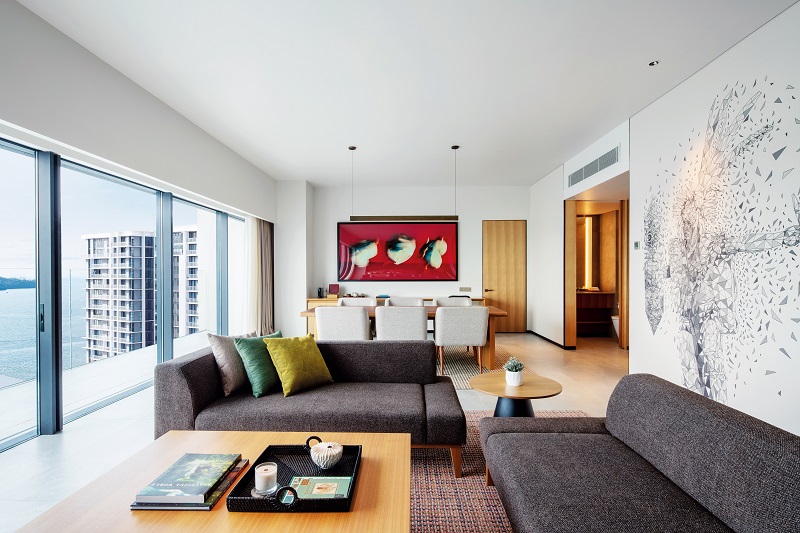
Floor-to-ceiling windows and a private balcony lure guests to step out for a nightcap as the city lights blink out one by one or catch a snatch of insect chorus in the still of the night at a distance from rooms facing the hill.
Leave the drapes ajar if you like to be awakened by nature’s first rays. Then tuck into a fortifying breakfast before heading out, be it to a longhouse, the malls or the very heart of nature. Many places are within easy reach and, with some planning, you can return in good time for finger-licking seafood to cap off your day.
The Danum Valley Conservation Area, Kinabatangan Wildlife Sanctuary, Gunung Mulu National Park and Mount Kinabalu have their own attractions for those keen on flora and fauna, the outdoors, activity and challenge. Imbak Canyon, 300km southwest of Kota Kinabalu, is where participants gather to test metal and mettle in gruelling 4WD safaris that can last from four days to eight or more.
For something definitely less strenuous, take a three-hour drive to a Kudat longhouse and watch wizened ladies weave mats or string colourful necklaces with beads, plant seeds and clay. Visitors are spoilt for choice when it comes to gifts made by these artisans.
Sipadan and Mabul beckon first-time divers and those fascinated by life under the sea. But for most of us, island-hopping is as far as we would go. Board a boat at Jesselton Point Ferry Terminal, a five-minute walk from Hyatt Centric, then transfer onto a yacht that takes you further out to sea. The high point of such trips is when the captain drops anchor and you have a couple of hours to fish or splash around and work up an appetite for lunch on a nearby island.
hyatt_centric_kota_kinabalu_-_hotel_exterior_cbd.jpg
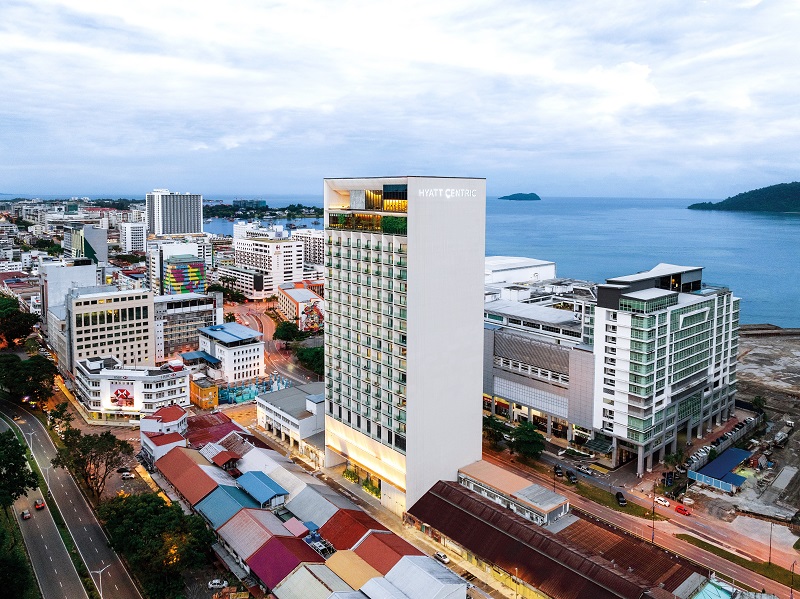
Trips out start from 8.30am and an ambitious tourist can cover four islands in one day, double the recommended two. The last boat back is at 4pm, in good time to enjoy sunset on the rooftop and tipples served by staff decked out in cool uniforms designed by Melinda Looi.
Hyatt Centric may be seeped in the brand’s light spirit but it is not all about relaxation and play. For those who want to pair work with pleasure, there is 1,900 sq ft of meeting space with amenities to suit different needs.
The hotel is keen to work with locals, like arranging an art tour led by someone who works with Sabahan artists or lending its space to Malaysians eager to share what they do or have to offer.
Art offers a quick visual introduction to people — where they live, how they think and what is important to them. Take a stroll around Jalan Ewan and stop to stare at the various murals on dilapidated walls. From these and a clutch of installations as well as prominent old buildings that are still standing, visitors can trace a faint outline of Kota Kinabalu, where many parts of the city centre are built on reclaimed land.
copy_of_ruben_schrijver_general_manager_hyatt_centric_kota_kinabalu.jpg
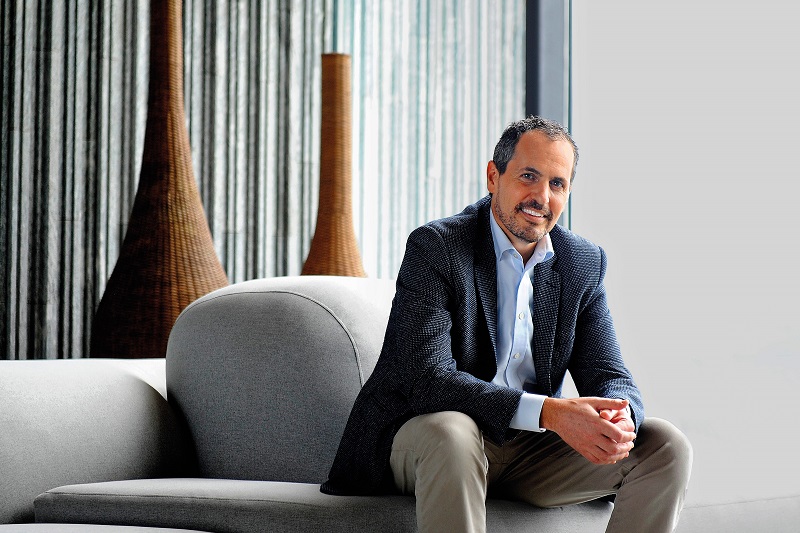
“We’re trying not to be a conventional hotel,” Schrijver says. “We want to be in the know and ride the waves of current trends. We feel collaborations with the community are something our clientele finds really important.”
During our media visit, the hotel hosted a pop-up by Dia Guild at the lobby to showcase ethical clothing, handbags, jewellery and hand-made gifts created by artisanal Southeast Asian brands.
Dia is a curated platform set up in 2020 by Malaysian friends Kylie, Aisha and Alia to support local artisans and designers. By serving as an avenue for these people to tell their stories, it hopes to build a global community of artisans, discerning consumers and supporters of culture from the region.
The co-founders lauded the diverse and rich heritage of craftsmanship in Southeast Asia and the high level of design. Yet many associate it with having poor-quality products. “We hope to reverse that by curating an incredible selection of Southeast Asian brands while building a bridge for them to reach the rest of the world,” they say.
This article first appeared on Mar 27, 2023 in The Edge Malaysia.


